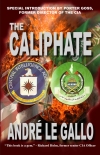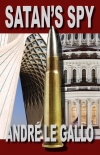The Caliphate by André Gallo (booksvooks .txt) 📗

- Author: André Gallo
Book online «The Caliphate by André Gallo (booksvooks .txt) 📗». Author André Gallo
***
One day after Karim came back from a run with the trainees, Rashid, a Moroccan Berber in his forties with a dark complexion and high forehead, called out to him.
“Karim, I want you to clean the engine of this drone. I’ll show you how and then you can finish it. These things weren’t made for a desert environment. Unless we can keep the sand out, it’s going to destroy the engines.”
Rashid spent two hours with him answering Karim’s questions on the workings of an internal-combustion engine.
A couple of days later, Karim made a point of sitting with Rashid at dinner.
“Where did you learn about UAVs?” he asked.
“Actually, I’m self-taught, but I attended a technical school near Casablanca, and one day I was given the chance to take an exam for a place in a French aeronautical school near Toulouse. The test was given in Algeria and Tunisia as well as Morocco. The school offered one slot to each country. I went and studied in France for two years.”
“Why didn’t you stay? I would have stayed,” Karim said, splitting the pit of a date out of his mouth.
“After the formal training, all of the French students were offered jobs in the French aircraft industry around Toulouse. The three of us kept getting turned down because we were Arabs.”
“The French are pigs,” Karim said. “So, what did you do? Go back to Morocco?”
Rashid laughed.
“Well, I felt isolated. The French students didn’t let us, the three Arabs, hang with them. One day, for something to do instead, we went to the Mosque. And we went back the following week.”
He reached for a piece of chicken in the plate of couscous.
“I don’t know what happened to the Tunisian and to the Algerian, but I found that the Salafists liked me. Eventually, I was introduced to Hussein when he was traveling through France, and he brought me to IMRA.”
Karim became Rashid’s best student and, at Rashid’s request, Hussein told Karim to stay at the camp as an assistant. Karim felt he was heading upward. He asked Rashid for manuals, which he pored over, asking a thousand questions about the UAVs. When Rashid taught him to pilot the little planes by remote control, Karim was as happy as he had ever been. Under Rashid’s tutelage, Karim became an accomplished UAV pilot.
One day under the camouflage netting, Rashid told Karim, “Our UAVs are not the most recent technology but we don’t need the latest technology. Our planes have the capability to carry out multiple functions including real-time or photo surveillance. Next week, I want you to help me experiment with different payloads.”
“What kind of payloads?”
“I’m going to adapt them to carry a number of different things since I don’t know what the mission is going to be yet. I want to know where to place cameras, sensors, or weapons. Right now, we don’t need the specific payload, just their weight and size.”
Rashid went and stood by one of his UAVs. He leaned down and touched its wing.
“Are they going to be flying bombs? Like the Americans’ smart bombs?” Karim asked.
“Don’t know yet.”
Karim concluded that Steve would want to know about these little planes and he started to mentally inventory them. Rashid had obtained the first UAV, the Mirsad-1, from the Lebanese Hezbollah.
“This one became famous when the Hezbollah used it against Israel during the 2006 war,” Rashid told him.
Rashid had four other UAVs, all obtained, Karim learned, through a retired American officer now in the arms business. Three, an IAI Harpy, an RQ-2, and an RUAG Ranger, had originally been developed in Israel. The Falcon was Jordanian, a joint venture between the King Abdullah Design and Development Bureau and Jordan Aerospace Industries, according to Rashid.
The Ranger was the closest to looking like and being a real airplane. Karim’s favorite was the RQ-2, bought and used by the U.S. Navy, which would retrieve it on board with the use of a net. With a wingspan of almost seventeen feet, it was no toy. But Karim found it easy to maneuver, and he loved to fly it around the skies of the Sahara, spotting caravans either in the distance or directly under the craft through its live TV system. Able to fly at an altitude of fifteen-thousand feet, it was unseen and unheard by people on the ground.
Karim made no notes, remembering that Steve told him it was too dangerous, but, since he worked with the planes on a daily basis, he found it easy to remember every detail because one day, Allah would put him back in touch with Steve. In the meantime, he continued to practice his remote flying skills over the Sahara.
33. McLean, Virginia
Steve went back to his West Gate job following his return to the United States and the award ceremony at Langley. His division chief, Charlie Van Diemen, a retired Air Force colonel, walked into Steve’s windowless office.
“You did it, Steve! We just received the first payment from the Moroccans for a two-year program to renovate Ben Guerir Air Base for fighter aircraft of the Moroccan Air Force.”
“That’s great. I discussed that project with the Moroccans but I never had the chance to go down there. Ben Guerir was used to support the Space Shuttle Program for a possible abort landing. I suppose we have other options these days.”
Van Diemen pointed to a plaque on the wall





Comments (0)